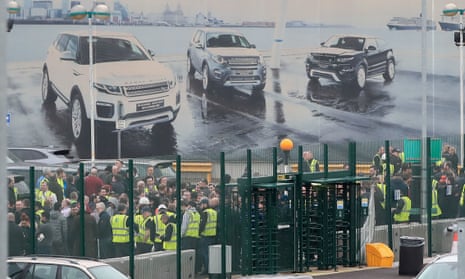Jaguar Land Rover and Ford are to cut thousands of jobs, including at least 2,000 in the UK.
Carmakers are struggling with challenges ranging from lower demand in China to a depressed diesel sales in Europe after the VW emissions scandal. British car sales fell for the second year running in 2018, by almost 7%, with consumer confidence dented by Brexit, according to the Society of Motor Manufacturers and Traders.
Both Ford and JLR warned that the longer-term future for the British car industry remains uncertain because of Brexit. Japanese carmaker Honda also said it will shut down its Swindon factory for six days in April, following the planned departure date on 29 March.
JLR, Britain’s biggest carmaker, said it will lose 4,500 jobs from its global workforce, the majority of them management roles in the UK at sites including Coventry and Gaydon. The company will start a voluntary redundancy programme.
Ford announced widespread cuts across its European operations on Thursday, although large-scale job losses are not expected imminently in the UK. However, Ford’s European president, Steven Armstrong, refused to guarantee there would be no redundancies at the carmaker’s Dagenham and Bridgend engine plants.
On Thursday, JLR, which has already launched a £2.5bn cost-saving programme, also announced investments worth hundreds of millions of pounds to produce electric drive units at Wolverhampton, and a new battery plant at Hams Hall in Birmingham that will be operational by 2020.
Ralf Speth, JLR’s chief executive, said the company was dealing with “multiple geopolitical and regulatory disruptions, as well as technology challenges”, although he promised a future range of British-built electric vehicles.
JLR’s sales fell by 4.6% in 2018 compared to 2017, but sales in China slumped by more than a fifth, according to figures also published on Thursday. In December Chinese sales plunged by 42.4% year-on-year, amid struggles with its dealer network as well as economic and trade uncertainty.
JLR has so far made £500m of cost savings, with 1,500 jobs going during 2018.
Ford’s Armstrong said a no-deal Brexit could result in further job losses in the UK, and did not rule out the closure of British plants if there were no agreement.
“If Brexit were to go in the wrong direction, we would have to have another look at what we have to do,” he said. “We would take whatever actions necessary […] Nothing would be off the table.”
Speth said the company was stockpiling parts in preparation for a no-deal Brexit, but that it could only prepare for “days, not weeks” of disruption as the company uses 25m separate parts per day.
JLR, owned by the Indian conglomerate Tata, announced 1,000 job losses at its Solihull factory in April 2018, after UK sales of the Range Rover and Discovery models fell, while 2,000 staff at its Castle Bromwich plant moved to a three-day week last year.
A spokesman for Theresa May said: “JLR have been very clear that they regard the UK as home and are investing in the future to develop the next generation of vehicles. We will continue to work closely with the company to support their long-term plans.”
The shadow business secretary, Rebecca Long-Bailey, called on the government to end the uncertainty around Britain’s departure from the EU.
“This is more concerning news for workers across Jaguar Land Rover today, who have suffered months of uncertainty, not least as a result of the government’s Brexit chaos,” she said.
“The government needs to realise that the automotive sector from factory floor and right across supply chains desperately needs tangible support, not warm words.”
Unions expressed concerns about the job losses. Roy Rickhuss, the general secretary of Community, said: “This news will worry all those working in Britain’s manufacturing sector. The looming threat of a disastrous no-deal Brexit is already having a real impact on jobs.
“The car industry plays a vital role in supporting other sectors, such as steelmaking. It is important that government, employers and unions work together to ensure supply chains are not harmed, and that Brexit does not cost us any more jobs.”
Ford is overhauling its European operations in an attempt to increase profit margins, including shutting down lossmaking vehicle lines.
The US carmaker is to abandon the multivan market – vehicles with more than five seats – stop manufacturing automatic transmissions in Bordeaux from August, review its operations in Russia, and combine the headquarters of Ford UK and Ford Credit to a site in Dunton, Essex.
Armstrong said the manufacturer is not making redundancies as part of the consolidation at Dunton.
Ford said it hoped to achieve most of any future job reductions through “voluntary employee separations”, and would start talks with unions.
The carmaker employs 14,000 people in the UK, including 3,000 who manufacture engines in Dagenham, east London, and 1,950 at a plant in Bridgend, south Wales.
Armstrong said: “We are taking decisive action to transform the Ford business in Europe.
“We will invest in the vehicles, services, segments and markets that best support a long-term, sustainably profitable business, creating value for all our stakeholders and delivering emotive vehicles to our customers.”
The company restructured its European leadership in December, saying it was carrying out a “fundamental reset and redesign of its business”.
